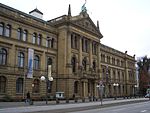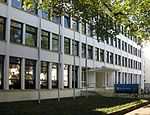Bundesrechnungshof

The Bundesrechnungshof (Federal Court of Audit) is the supreme federal authority for audit matters in the Federal Republic of Germany. There are equivalent bodies at state level. The status of the Bundesrechnungshof, its members and its essential functions are guaranteed by the German Constitution (Art. 114 GG), and regulated by other legislation (i.e. Bundesrechnungshof Act, Federal Budget Code). It is an independent judicial body, with around 600 employees. Its current President is Kay Scheller. The institution is a supreme federal authority only as far as it administers internal tasks such as personnel affairs, management of buildings or clearance of travel expenses and the like. Processing its core duties - auditing, reporting and counseling as external financial controllers - it is not part of the executive branch of Germany, but is positioned beyond the three classical constitutional powers. The Bundesrechnungshof is not subordinated to the federal government. Even the legislative (parliament) cannot instruct it. At best, the parliament can ask the authority to audit certain issues. From the third power, justice, it differs firstly by freely choosing the subject matters it intends to audit and secondly by not delivering legally binding rules, but by issuing recommendations. Bundesrechnungshof’s exact placement within a classical system of the division of powers is disputed.
Excerpt from the Wikipedia article Bundesrechnungshof (License: CC BY-SA 3.0, Authors, Images).Bundesrechnungshof
Adenauerallee, Bonn
Geographical coordinates (GPS) Address Nearby Places Show on map
Geographical coordinates (GPS)
| Latitude | Longitude |
|---|---|
| N 50.727777777778 ° | E 7.1116666666667 ° |
Address
Bundesrechnungshof
Adenauerallee
53113 Bonn (Stadtbezirk Bonn)
North Rhine-Westphalia, Germany
Open on Google Maps











